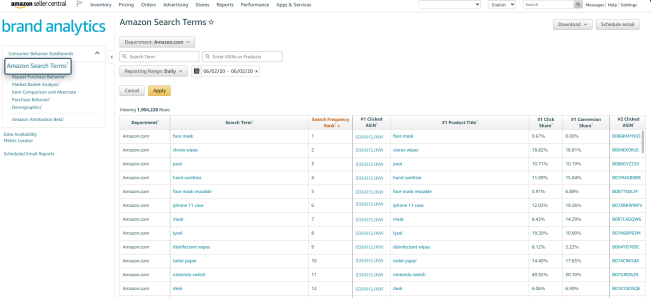ABA’s Search Terms reports, not to be confused with the standard search reports from Amazon advertising, enables you to look at search trends and the top three ranking ASINs per term. For most brands, Search Terms are possibly the most valuable reporting function within ABA. It’s the only ABA report that deals with ‘market data’ — all of the other reports are directly tied to your ASINs.
Search Term reports give a ranking of a particular search term in terms of volume and the percentage of sales and clicks for the top three items for that search term. You can search the report via category, search term or ASIN — however, you will only be able to look up ASINs if they rank in the top three clicks of conversions for a given term.
Essentially, this report shows how customers find products on Amazon by revealing the most popular search terms at any given time, along with each term’s search frequency rank. However, this report doesn’t provide the actual search volume — just comparative rankings and shares.

What is in the Search Term reports?
Click share & conversion share
Within Search Term reports, you can view something called Click Share. This is the percentage of times that Amazon shoppers click on a product after searching for a specified term. Click Share is divided by the number of times customers click on any product after searching for that term.
Conversion Share is similar, but it focuses on how many times buyers purchased an item for a specific search term. This number is divided by how many times customers purchased anything from that search term.
Conversion Share differs slightly from Click Share, as it doesn’t correspond to the ASIN that received the most conversions for the given search term. It represents the percentage of total sales the #1 clicked ASIN received for the keyword. This can present a problem for understanding conversion share if the highest converting products aren’t also the top three most clicked.
Clicked ASIN
The Clicked ASIN field is designated for the ASIN that received the most clicks from shoppers who searched this keyword. It’s important to note that this field does not mean that the product ranked in the first organic position.
What can I do with Search Term reports?
Help with product research: You can use Search Term reports to find new search terms that didn’t originate from your auto campaigns even when your products weren’t ranking for them.
Reveal market share: Search Term reports can reveal what percentage of conversions you get for a search term and what percentage your competitors are getting.
Better understand your competition: By doing a reverse ASIN lookup you can find out what search terms your main competitors are ranking for.
Benchmark click through rates: You can use Search Term reports to see what percentage of customers are clicking on your competitors’ products. This data gives you a reliable indication of whether you should optimize your titles and/or main gallery image to increase your own click rates.
What can't I do with Search Term Reports?
Provide search volume data: The Search Term report only shows you the rank of frequency, not volume. Between each search frequency rank, there might be either a handful of searches or billions of searches, and there’s no way to know how many.
Show all search term ranking: The Search Term report only shows a maximum of three rankings for a given search term. Depending on the volumes, it might only be the top-ranking ASIN. There is a whole ‘long-tail’ of Amazon ASINs that simply aren’t captured by this report.
Rank top ASINs by conversion share: When you run a Search Term report, the top three ASINs are ranked by percentage of Click share, not Conversion Share. This means that sometimes the third ASIN has the fewest Click Shares but the highest Conversion Share.
Enable search term flexibility: The Search Term function doesn’t treat close variants and misspellings the same way as a normal exact keyword, you’ll need to experiment with every possibility when determining your best keywords. Test synonyms to find the highest-searched search terms.

